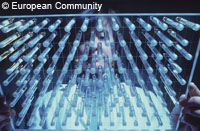Europeans becoming more optimistic about biotechnology, survey finds
The latest Eurobarometer survey reveals that Europeans are becoming more optimistic about biotechnology, with 52 per cent of those polled saying they believed biotechnology would improve their quality of life. 'Europeans and Biotechnology in 2005: Patterns and Trends' is the sixth in a series of surveys carried out by the European Commission on Europeans' attitudes towards biotechnology. This latest survey, based on a representative sample of 25,000 respondents from across the EU, covers stem cell research, genetically modified food, nanotechnologies and the role of the public and scientists in governance. The rise in optimism about biotechnology is good news for the sector. In the first survey in 1991, optimism levels were similar to now. However, during the 1990s, support for the sector declined steadily, reaching a low point of 41 per cent in 1999. Since then, it has increased again. During the same period, the public's trust in both university and industry scientists has also increased substantially, to 73 per cent and 64 per cent respectively. On stem cell research, a majority - 59 per cent- support embryonic stem cell research, as long as it is tightly regulated, rising to 65 per cent for non-embryonic stem cell research. Although most Europeans believe an embryo is human immediately after conception, for many this is outweighed by the potential benefits of stem cell research like improvements in health or treatments for diseases. Industrial applications of biotechnology are also widely accepted and supported by the European public, with over 70 per cent of respondents supporting incentives to develop biofuels and bioplastics. The one area of biotechnology which continues to meet high levels of resistance among the European public is genetically modified (GM) food. Around half of the participants in the survey had an opinion on GM food; of those, 58 per cent were against it, and 42 per cent were in favour of it. According to the study, participants felt the potential benefits of GM technology do not outweigh the perceived risks associated with it. When asked what would induce them to buy GM food, many respondents said they would buy GM food if it were healthier and/or contained less pesticide residues. Europeans are becoming more knowledgeable about science and technology, with a majority saying they are interested in the subject and keep up to date on what is going on in the area. In general, those who are most interested in science are also more likely to be more optimistic about its benefits. If they have to make a decision on biotechnology, for example in a referendum on stem cell research, Europeans are not so interested in finding out about the scientific details, but want to be informed about the possible impacts of the technology on society. Regarding governance of science and technology, the survey results indicate that there is a strong desire for moral and ethical criteria to be considered alongside scientific evidence. A Biotech policy roundtable in Helsinki, organised on 20 June by the outgoing Austrian EU Presidency and incoming Finnish EU Presidency, aims to review the European Strategy for Life Sciences and Biotechnology and discuss the actions necessary to take it forward.

